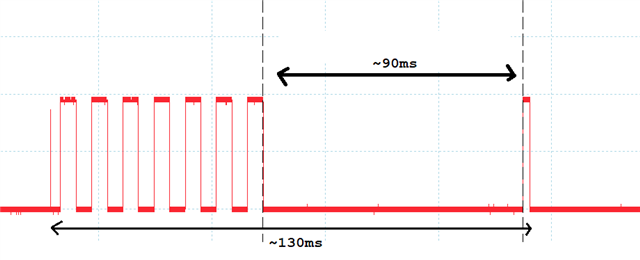Hi,
On nRF52840, on example https://github.com/zephyrproject-rtos/zephyr/tree/main/samples/subsys/mgmt/mcumgr/smp_svr bluetooth stack configurations
I am calling fs_write( less than 512bytes) and I have the main thread frozen for ~130ms.
I tried calling fs_write from a different thread and I have now the main thread frozen for ~90ms:
static void saveFlashThread(void* p1, void* p2, void* p3)
{
while(true)
{
k_msleep(10);
if(flag)
{
flag = false;
debugPinHighLow();
fs_open(&file, path, FS_O_WRITE);
fs_write(&file, array, size);
fs_close(&file);
debugPinHighLow();
}
}
}
K_THREAD_DEFINE(saveFlashThreadId, 1024, saveFlashThread, NULL, NULL, NULL, 7, 0, 0);
static void mainThread()
{
...
flag=true;
...
while(true)
{
k_msleep(5);
debugPinToggle();
...
}
}Please kindly advise, you know of an asynchronous flash write function? Or is other way to write the thread so that fs_write() will not cause freeze in other threads?

The curious thing is that only part of fs_write call is blocking: may you know if the low level function code is public? If yes, where can be found for board nRF52840?
ssize_t fs_write(struct fs_file_t *zfp, const void *ptr, size_t size)
{
...
rc = zfp->mp->fs->write(zfp, ptr, size);
fs_file_system_t /* File operations */
{
...
ssize_t (*write)(struct fs_file_t *filp, const void *src, size_t nbytes);
Kind Regards,
Iulian
MSc.MEd. Software Engineer and Trainer
"But God demonstrates His own love for us in this: While we were still sinners, Christ died for us." (Romans 5:8)

